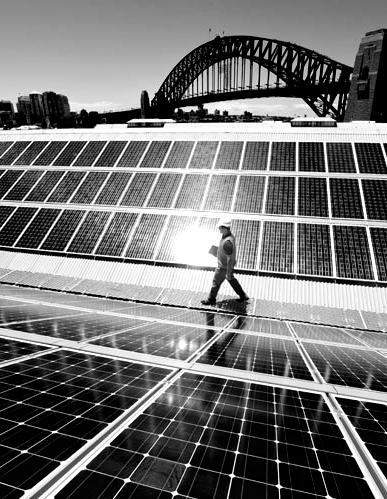Big solar walks as Government baulks
 The Australian Federal Government’s skittishness about renewable energy systems has forced one solar power giant to look elsewhere.
The Australian Federal Government’s skittishness about renewable energy systems has forced one solar power giant to look elsewhere.
Chinese solar firm Suntech, which was formed around some Australian solar technology, says it will close its local research labs due to the uncertain future of renewable energy in Australia.
Jobs will be lost along with millions in investment funds, as Suntech prepares to close the Suntech R&D Australia unit in coming weeks.
“Suntech wants to continue a relationship with Australia, but it no longer makes the same sense to keep a research team [here],” Renate Egan, managing director of the Sydney-based R&D unit, has told Fairfax Media.
Suntech will return to its base in China as the Abbott government signals it wants to cut the national renewable energy goal, calls which have reduced confidence about future opportunities for most providers.
“Clearly the market's not going to grow here,” Dr Egan said, referring to large-scale projects.
The government will soon release recommendations from the panel reviewing the Renewable Energy Target, which is populated by former Caltex chairman and climate change sceptic Dick Warburton. Insiders expect the panel will back a cut of the current goal, or scrap it entirely.
It is understood that Suntech’s $6 million investment in projects with the University of UNSW has been secured until 2018.
In an interview for the Sydney Morning Herald, Richard Corkish, chief of the Australian Centre for Advanced Photovoltaics at the University of New South Wales, said the loss of the Suntech unit would see talented people heading overseas.
Dr Corkish said there has “not been too much good news” lately for Australia’s renewable energy industry, but that “we hope as big a fraction as possible [of the researchers] can remain in Australia.”
But prospective students “will look with some trepidation at the current job prospects in Australia,” he said.
While there is a grey outlook for green energy in Australia, a recent research report from investment giant UBS said that solar panels combined with advanced storage would be able to compete with conventional power grids by 2020.
Economists say battery prices would halve by the decade's end, giving the solar-storage combination a payback period of six to eight years from then.







 Print
Print